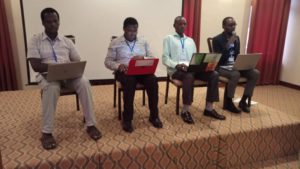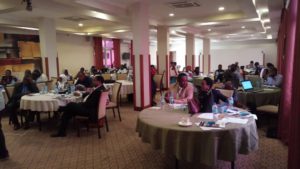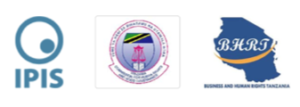Dar es Salaam, 18 March 2020
For the second time, Business and Human Rights Tanzania (BHRT), the Tanzanian Commission for Human Rights and Good Governance (CHRAGG) and the International Peace Information Service (IPIS) brought together key stakeholders from civil society, the business community and various government agencies from Tanzania mainland and Zanzibar for an annual multi-stakeholder dialogue on Business and Human Rights.
The main purpose of this annual dialogue is to raise awareness, build trust and ensure multi-stakeholder buy-in to advance the agenda on business and human rights in Tanzania.
In line with the first multi-stakeholder dialogue, the day’s programme invited participants to discuss key concepts, (inter-)national frameworks and local examples of business and human rights. Special attention was brought to issues related to ‘land rights and environment’. This topic was a first priority topic for BHRT, CHRAGG and IPIS in their joint project on “Improving monitoring, research and dialogue on Business and Human Rights in Tanzania”.
Four case studies on current issues of “land rights and environment” were presented. These studies were conducted by Tanzanian civil society organisations Lawyer’s Environmental Action Team (LEAT), the Land Rights Research and Resources Institute (HakiArdhi), Tanzania Women Empowerment in Action (TAWEA) and Community Economic Development and Social Transformation (Cedesota). In the past six months, they studied the immediate effects of the Land Tenure Support Programme to communities in Kilombero district (Morogoro), how Land Use Planning can be a tool for promoting Land Governance in Kilolo District (Iringa) and how protected areas in Kigoma and Arusha region can cause land and human rights issues in communities adjacent to these protected areas. This work will be published as the second volume in the series “Voices from Tanzania”.
The importance of participatory land governance is concluded primordial to protect and promote basic community and business rights across Tanzania. Inclusive (village) land use planning processes and stakeholder dialogues have the potential to reduce disputes over land ownership and land use, which in turn can prevent further conflicts and human rights issues.
As a next priority topic, conference participants proposed to focus on the impact of (large) infrastructure projects on community’s human rights. The results of this work will be presented at the next multi-stakeholder conference, to be held later this year.
The meeting was cut short due to government measures to deal with the Covid-19 outbreak. Further group discussions and side sessions therefore had to be cancelled.
We thank all stakeholders for their participation and their dedication to push for progress on business and human rights in Tanzania.
Read all about the event’s presentations, discussions, conclusions and recommendations on the way forward for ‘Business and Human Rights in Tanzania’ in the conference report.
To stay up to date on Business and Human Rights in Tanzania, subscribe here
Join the conversation on Twitter #bizhumanrightsTanzania
This event is part of the ‘Improving monitoring, research and dialogue on Business & Human Rights in Tanzania’ project implemented by CHRAGG, BHRT and IPIS, with the financial support of the European Instrument for Democracy and Human Rights.





